DataOps is an agile bridge linking data engineering, analytics, and outcomes.
Managing big data in today’s digital world and the competitive landscape is very complex for businesses’ success. DataOps focus on the data science industry and play a significant role in progressing large raw data into actionable insights. DataOps encompasses people, processes, and technology, enabling businesses to utilize data sources, pipelines, and cloud storage strategically. However, companies and organizations that adopt effective dataops practices have enhanced and informed decision-making, frequent uncovering of revenue opportunities, and optimizing workflows. In this blog, we will explore what is dataops, devops vs dataops, dataops lifecycle, and what dataops services could help an organization to thrive. Let’s get started.
DataOps is the agile practice in which the flow of data can be managed effectively within a business, encompassing technology and skilled individuals.
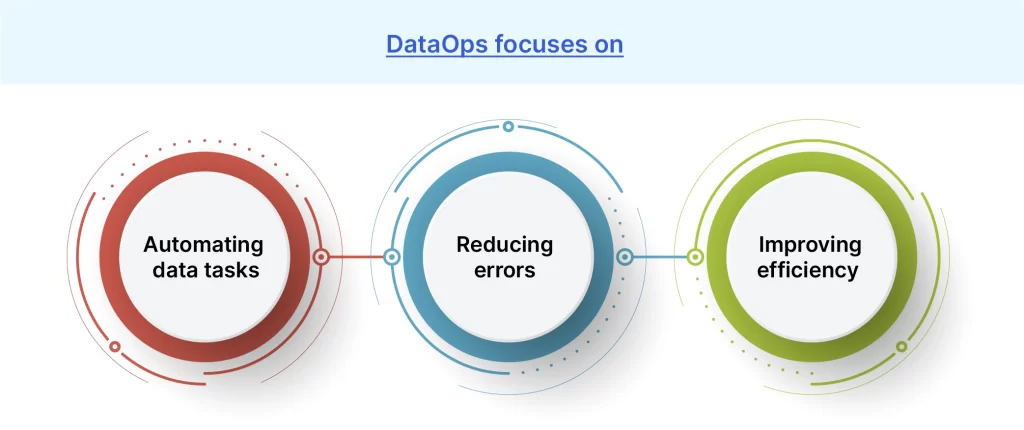
Let’s simplify it:
Suppose that DataOps is similar to a DevOps team in a software company. DevOps specializes in software development and maintenance, and DataOps specializes in managing data flows between systems, securing data sources, and making data useful for the entire business.
In addition, within a DataOps team, there are different roles and specialties;
Data engineers: Data engineers work with data management tools and build pipelines.
Data quality teams: They monitor the health and performance of the data flow.
Data scientists: Data scientists and analytics teams drive decision-making.
Machine learning specialists: Machine learning specialists leverage cloud data storage to discover new revenue opportunities and track advanced metrics.
Managing data nowadays is a complex task and gaining valuable insights is mandatory for business. In this way, we cannot ignore the significance of DataOps for the ultimate growth of an organization.
However, Businesses can unlock several valuable advantages by implementing DataOps;
Automated data pipelines ensure efficient and error-free data flow. Access to meaningful insights is simplified, enabling teams to make informed decisions.
Leveraging raw data sets improves customer experience and satisfaction. Streamlined business processes lead to improved customer acquisition and retention.
Real-time business intelligence enables faster executive decision-making. Market trends and customer behaviors can be analyzed and acted upon promptly.
Increased agility allows businesses to respond quickly to market changes. Adaptation to new customer behaviors and preferences becomes easier.
DataOps eliminates data silos and promotes collaboration across teams. Siloed data is consolidated, leading to better data accessibility and insights.
Data-driven insights optimize marketing strategies, increasing conversion rates. Lower customer acquisition costs result from targeted and personalized campaigns.
DataOps accelerates data analysis and reporting processes. Increased accuracy ensures reliable insights for informed decision-making.
DataOps enables the scalability of processes to handle growing data volumes. Self-service access empowers users to navigate data workflows independently.
By aligning your DataOps team, technology, and strategy, you can harness the power of data to solve critical business challenges and drive success.
DataOps | DevOps |
|---|---|
A methodology focused on the management and operations of data within an organization, ensuring data quality and accessibility. | A collaborative approach that bridges the gap between software development and IT operations, emphasizing automation and continuous integration and delivery. |
DataOps | DevOps |
|---|---|
Focuses on data management, data quality, and data operations. | Focuses on software development, deployment, and operations. |
DataOps | DevOps |
|---|---|
Ensures accurate, accessible, and actionable data for stakeholders, improve data quality, and enables efficient data operations. | Improves collaboration, automation, and delivery of software applications, aiming for speed, agility, and reliability. |
DataOps | DevOps |
|---|---|
Encourages collaboration between data engineers, data scientists, and business stakeholders to manage and optimize data processes. | Promotes collaboration between developers, operations teams, and other stakeholders to streamline software development and deployment. |
DataOps | DevOps |
|---|---|
Data collection, processing, analysis, data governance, data lineage, and data delivery. | Continuous integration, continuous delivery, automated testing, infrastructure management, and deployment automation. |
DataOps | DevOps |
|---|---|
Improved data quality, enhanced data accessibility, faster and more reliable data operations, actionable insights, and improved decision-making. | Faster software development cycles, reduced time-to-market, improved collaboration, increased reliability, and efficient infrastructure management. |
DataOps | DevOps |
|---|---|
Data engineering, data governance, data science, data analysis, and business understanding. | Software development, automation, system administration, infrastructure management, and cloud technologies. |
In the last of this detailed comparison, we can say that DataOps focuses on data management and operations, ensuring high-quality and accessible data, while DevOps emphasizes collaboration and automation in software development and operations.
Thus, both methodologies can complement each other in organizations that deal with data-intensive software applications, enabling efficient development, deployment, and management of both software and data assets.
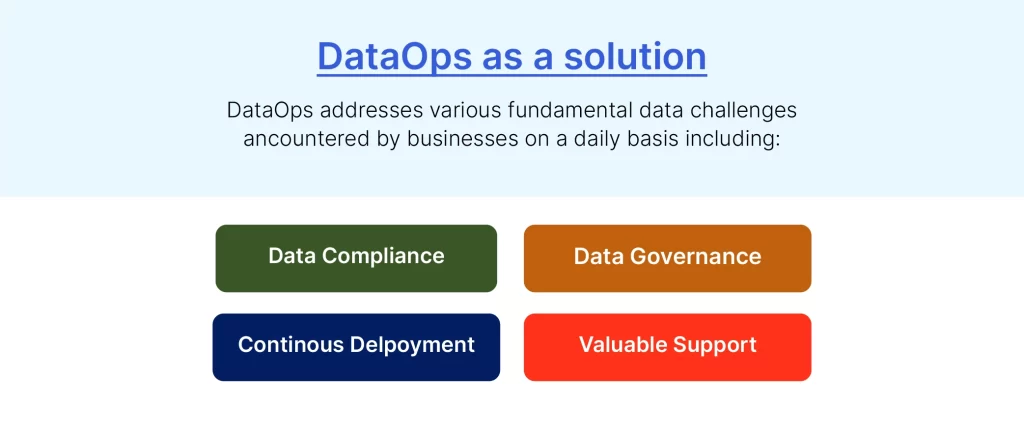
Companies can gain the ability to analyze entire business infrastructure, including databases and storage systems. However, DataOps also enables companies to assess the performance of their data pipelines, establish a comprehensive data lineage for review, and effectively handle situations where system failures or data loss occur.
In addition to this, organizations can determine the necessary backup strategies required for data recovery in the event of any detrimental incidents affecting their IT infrastructure.
DataOps framework allows for continuous assessment of critical applications and databases within your organization ensuring ongoing visibility into the health of data workflows, such as;
If you’re seeking assistance with addressing your data challenges and optimizing your data operations, our DataOps experts at IntellicoWorks are here to help.
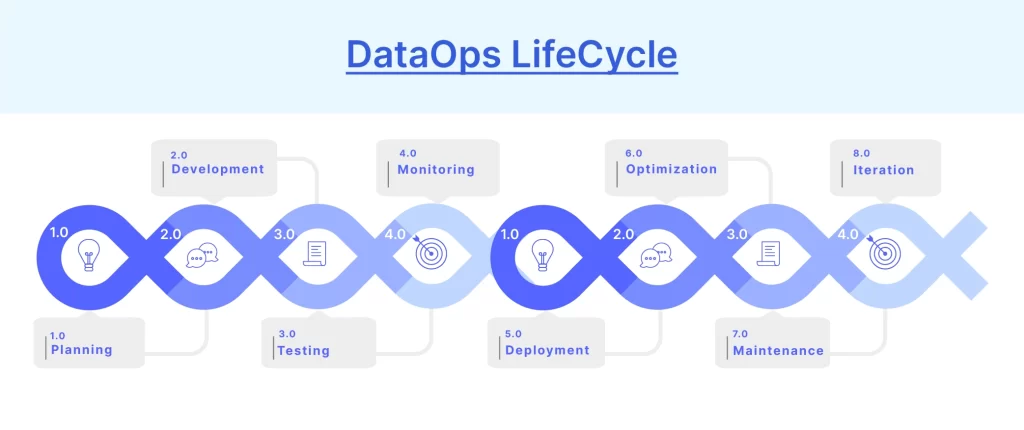
The DataOps lifecycle consists of several stages that encompass the management and operation of data processes within an organization. Here are the key stages of the DataOps lifecycle:
Planning: In this initial stage, organizations define their data goals and objectives. They identify the data sources, determine the required data infrastructure, and plan the implementation of DataOps practices.
Development: This stage involves the actual development of data pipelines, workflows, and integration processes. Data engineers and developers work together to design and build efficient data architectures and workflows that enable seamless data integration and processing.
Testing: Once the data processes are developed, they undergo rigorous testing to ensure their reliability, accuracy, and performance. This includes validating data quality, verifying data transformations, and testing the integration with various systems and applications.
Deployment: After successful testing, the data processes are deployed into the production environment. This stage involves setting up the necessary infrastructure, configuring connections to data sources and targets, and ensuring the smooth execution of data workflows.
Monitoring: Continuous monitoring is a critical stage in the DataOps lifecycle. It involves real-time monitoring of data processes, tracking data quality metrics, and detecting anomalies or issues. Monitoring helps ensure the reliability and efficiency of data operations and enables proactive resolution of any emerging issues.
Optimization: In this stage, organizations focus on continuously improving the performance and efficiency of their data processes. This may involve optimizing data workflows, identifying and addressing bottlenecks, and leveraging automation and advanced analytics techniques to enhance data operations.
Maintenance: DataOps requires ongoing maintenance to ensure the reliability and effectiveness of data processes. This includes regular updates, patching, and system maintenance activities to address any vulnerabilities, improve performance, and accommodate changing business needs.
Iteration: The DataOps lifecycle is iterative, with organizations constantly refining and enhancing their data processes based on feedback, insights, and changing requirements. This iterative approach allows for continuous improvement and adaptation to evolving data needs.
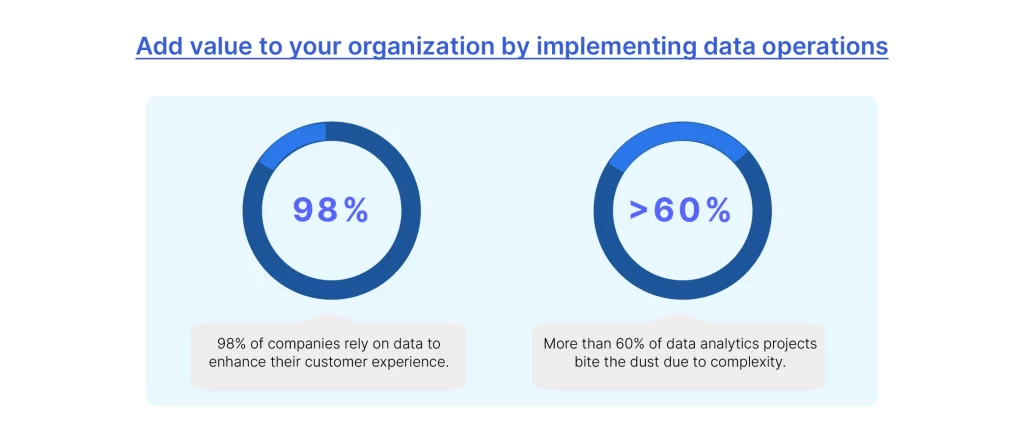
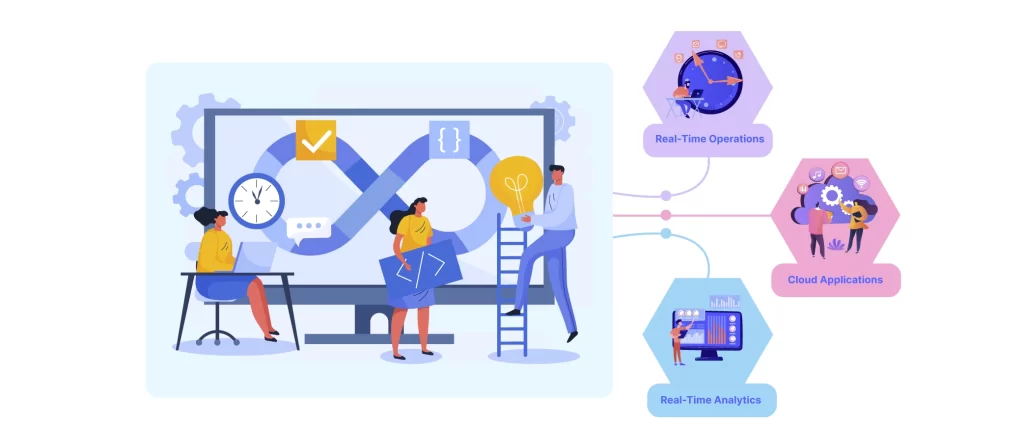
In conclusion, embracing a DataOps architecture is vital to unlocking the full potential of your data and driving organizational success. By integrating DataOps practices into your systems, you can optimize data flows, enhance data integration, and leverage real-time analytics for actionable insights. With IntellicoWorks’ comprehensive DataOps services, including advanced capabilities in data ingestion, pipelines, integration, and AI-driven analytics, you can revolutionize your data management processes.
Experience uninterrupted data flow across public and private clouds through our intelligent pipelines. Take the first step towards unleashing the power of DataOps by requesting a free demo with IntellicoWorks and exploring the possibilities for your organization’s growth and efficiency.
Follow IntellicoWorks for more insights!

Talk to us and let’s build something great together
A Subsidiary of Vaival Technologies, LLC
IntelliCoworks is a leading DevOps, SecOps and DataOps service provider and specializes in delivering tailored solutions using the latest technologies to serve various industries. Our DevOps engineers help companies with the endless process of securing both data and operations.
Ops
Cloud
AI & ML
Copyrights © 2023 byIntellicoworks. All rights reserved.